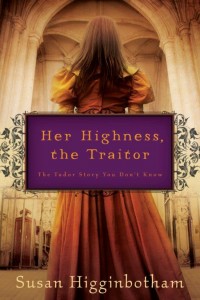Perseverance & Quiet Courage
By Myfanwy Cook
An interview with Susan Higginbotham
 MC: What motivated you to become interested in the history of fourteenth- and fifteenth-century England?
MC: What motivated you to become interested in the history of fourteenth- and fifteenth-century England?
SH: I had long had a mild interest in medieval history, particularly the Wars of the Roses, since reading Shakespeare’s history plays, but I didn’t start to do serious research until a few years ago when I happened to re-read Marlowe’s Edward the Second [published 1594]. For some reason, the historical background to the play intrigued me, and I started reading everything about Edward II’s reign that I could. Gradually, this led me forward into the Wars of the Roses and Tudor England.
MC: How do you select your main characters and why?
SH: I look for someone whose story intrigues me and to whose tale I can bring a fresh perspective. I’m particularly drawn to strong women — not “kick-ass” characters, but women with quiet courage: the women who can persevere when the odds are against them, like Margaret of Anjou in The Queen of Last Hopes, or who can rebuild their lives in the face of tragedy, like Frances Grey and Jane Dudley in Her Highness the Traitor.
MC: Have you a favourite character that you haven’t written about yet?
SH: I would love to write about Margaret Beaufort, Henry VII’s mother. She’s often reduced to a caricature by historical novelists, and she deserves so much better. She took a stand against Richard III at the risk of her own life and triumphed to see her son and her grandson on the throne of England.
MC: How important is historical accuracy in your writing?
SH: It is very important, though of course I’ve made my share of blunders. I feel very strongly that a novelist should remain true to the known facts and shouldn’t smear a historical character’s reputation just for the sake of making a story juicier or for making a protagonist more sympathetic. Many readers get their notions about history solely from reading historical fiction, and I think we owe it to those who can’t speak for themselves to treat them fairly. There are always going to be villains and heroes in novels, of course, but one shouldn’t turn a mere womanizer into a rapist, for instance, without having a solid historical basis for doing so.
MC: What inspired you to write your fifth novel Her Highness, the Traitor, which will be published in June 2012?
SH: I read Leanda de Lisle’s The Sisters Who Would Be Queen (HarperCollins, 2008), and I was shocked to realize how little truth there was in the traditional representation of Frances Grey. I thought that it would be intriguing to tell the story of the events surrounding Jane Grey’s brief reign from Frances’s point of view. Early in the research, however, I came across some writings of Guildford Dudley’s mother, Jane Dudley, and they moved me so much I had to include her in the novel too.
MC: Are you already writing your next novel and if so what is the theme?
SH: It’s about Margaret Douglas, Countess of Lennox, grandmother to James VI and I. I’m in the early stage of writing, and am still getting to know Margaret — it usually takes me a few chapters to do so.
MC: Did winning an Independent Publisher book award have a great impact on your confidence as a historical novelist?
SH: It certainly helped! But I don’t think a novelist ever ceases to worry about how her next novel is going to be received. I wouldn’t want to read a novel by someone who doesn’t worry about this, as a matter of fact.
For further details on Her Highness the Traitor (Sourcebooks, 2012), please visit www.susanhigginbotham.com.
About the interviewer: Myfanwy Cook runs historical fiction writing workshops and is an HNR Features Editor.
______________________________________________
Published in Historical Novels Review | Issue 60, May 2012






